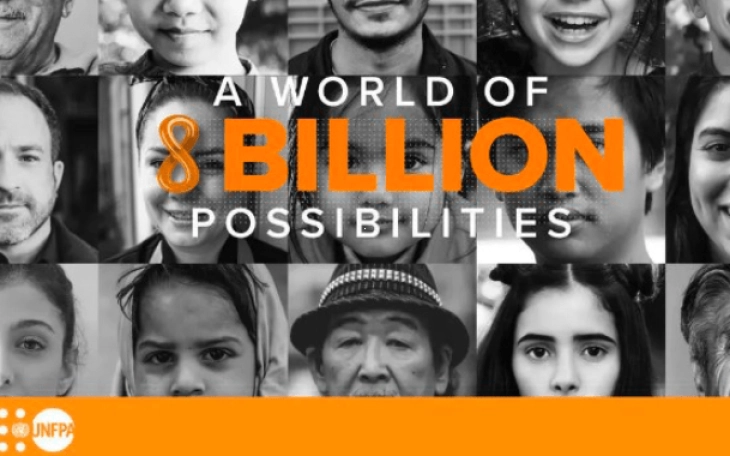UNFPA: World population reaches 8 billion

Skopje, 15 November 2022 (MIA) - Today’s milestone of a still-growing world population reaching 8 billion must not distract from the consequences that countries with shrinking population numbers could face if they fail to rethink the way they address demographic change, Florence Bauer, the Director of UNFPA’s Regional Office for Eastern Europe and Central Asia, said today.
Globally, population growth has slowed down considerably, and has started to reverse in an increasing number of countries, most of them in Central and Eastern Europe, where a combination of outmigration and low birth rates has sent population numbers down. This affects the future of economies, social systems, and infrastructures, UNFPA said in a press release.
“In their responses to population decline, governments tend to focus on increasing birth rates and providing people with financial incentives to have more children,” said Bauer.
“But we have seen that this does not work. What is needed is a broad range of measures that make it easier for people to build a future in their own country, instead of having to look for opportunities elsewhere, and to have the number of children they desire.”
This requires a rethink of how countries approach demographic change, Bauer said: Moving away from an overemphasis on numbers and perceptions of threats, and towards seeing demographic change as an opportunity to build stronger and more inclusive societies.
With large numbers of people leaving their countries to work elsewhere, and birth rates at low levels, Eastern Europe has been the first world region to experience sustained population decline over the past decades. Currently all but one of the world’s ten fastest shrinking countries are in Central and Eastern Europe.
“Of course, numbers are important, but an over-emphasis on the numeric size of populations can easily distract from what really matters for the success of population policies: creating societies in which people want to live and have families,” said Bauer.
Evidence suggests that a mix of policies is most likely to make a difference. This includes investments in early childhood care, generous family support benefitting men and women, measures to make it easier for women and men to combine family and career duties, expanding job and housing opportunities for young people, and a fair distribution of care and household tasks between men and women.
Strengthening inclusion is also key for making countries fit for demographic change. This includes removing barriers for women, older people, immigrants and those on the margins of society to fully contribute to the economy and public life.
UNFPA, the United Nations Population Fund, supports governments through its Demographic Resilience Programme in developing comprehensive policies to address demographic change based on evidence and human rights. It works with governments, civil society and the private sector on a range of programmes, including expanding gender-responsive family policies, fostering a more equal distribution of care responsibilities between men and women, strengthening opportunities for young people, and building societies for all ages.
The latest UN projections suggest that the world’s population could grow to around 8.5 billion in 2030 and 9.7 billion in 2050, before reaching a peak of around 10.4 billion people during the 2080s. The population is expected to remain at that level until 2100.







